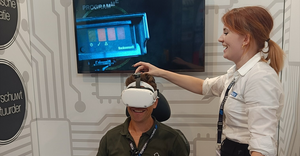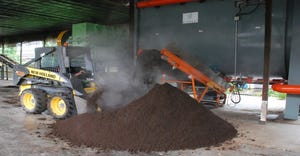Episode 134: The Road from Collections to Sustainability
Tune in to this week’s NothingWasted! podcast as we chat with Ty Rhoad, regional director Americas, at TOMRA. Rhoad shared his insights on the role of sorting technology in reducing CO2 emissions, the power of partnerships in driving the circular economy and more.
The company has pioneered the automation of waste sorting. Its flexible sorting systems perform an extensive range of sorting tasks and are able to both prepare and sort various types of metals and waste for either material recycling or energy recovery.
Here is a sneak peek into the discussion:
Waste360: The waste stream has certainly changed over the past decade or so. What are you seeing, and how you are tackling that?
Rhoad: Absolutely. One thing I’ve learned in joining TOMRA is more the global aspect of the waste stream and seeing how different countries attack their waste issues — different streams from country to country or, here in the U.S., region to region. This is what makes waste management so interesting and difficult.
Waste360: What do you think about the current recycling infrastructure here in the U.S.?
Rhoad: The U.S. infrastructure, especially since the China ban, is behind. But seeing what’s taking place — the investments — is amazing and obviously much needed. The infrastructure is growing, which is good — and quite honestly it needs to. I think the U.S. is catching up; the progress is starting. There are a couple of reasons for that — the circular economy coming into play; sustainability is a hot topic right now. And, companies focusing more on recycled materials.
Waste360: You spoke at Waste360’s Sustainability Talks at WasteExpo in June and discussed how the technology needs to be in place to take the pressure off consumers a little bit. Can you talk about that?
Rhoad: Seeing what technology has done — even just within the past 10 years — is just amazing. And I think we need to focus on that more. It’s a big thing that TOMRA has done, and we’ve released a white paper about the idea of a holistic resource system and relying on technology a lot for success in the circular economy. TOMRA has looked at this to see what we can do to optimize reduction of CO2 emissions. We break it down into three elements of collection: separated collection; a deposit-return system; and the mixed-waste sorting, where technology plays a big role, with the ability to sort and wash. The greenfield studies have shown that we have reduced CO2 emissions up to 3 billion tons a year, so it’s just amazing. This is obviously in a perfect world.
Waste360: What does “circular economy” mean to you?
Rhoad: I think the biggest thing we have to look at right now is the materials. To me, the circular economy…we always say ‘reduce, reuse, recycle;’ how can we have this material we have right now and continue to use it? So, at the most basic form, the circular economy could mean reusing and recycling this material in the best way you can.
Waste360: What’s next for TOMRA and you?
Rhoad: Right now, a lot of talk has been about Artificial Intelligence (AI) and deep learning. So, looking exactly at objects and recognizing them through technology. So I think the AI is kind of that next step—not only seeing a bottle but what kind of bottle that is, not material-wise, but is that a certain brand of bottle as well? And then taking that data and collecting it—and putting it to use.
Listen to the full episode above.
#NothingWastedPodcast
About the Author(s)
You May Also Like




